Vice President William Lai (賴清德) won the presidential election last night, delivering the Democratic Progressive Party (DPP) a record third term in office.
It is the first time since direct presidential elections began in Taiwan in 1996 that a party has won the presidency in more than two consecutive elections.
Voting began at 8am at nearly 18,000 polling stations, with almost 20 million people eligible to cast ballots. Polls closed at 4pm, with vote-counting by hand starting almost immediately. There was no electronic, absentee, proxy or early voting.
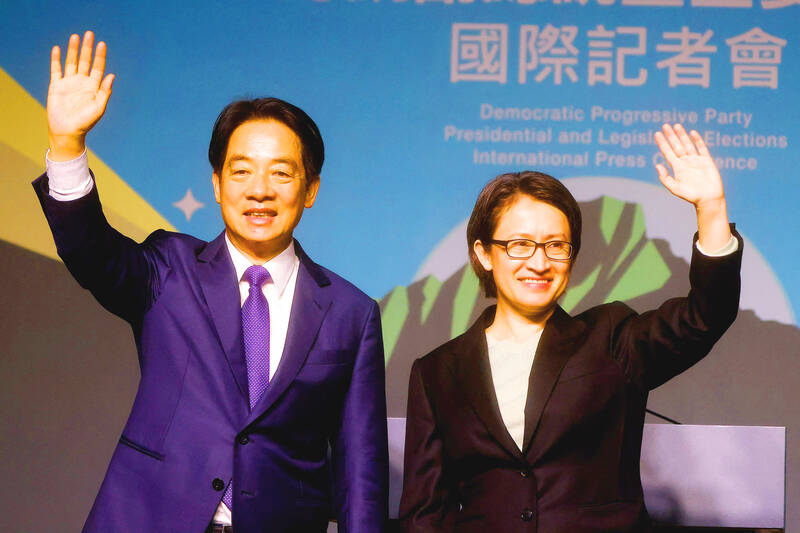
Photo: Ann Wang, Reuters
DPP presidential candidate William Lai (賴清德) received 5,586,019 votes, or 40.05 percent of the total, while Chinese Nationalist Party (KMT) candidate and New Taipei City Mayor Hou You-yi (侯友宜) won 4,671,021 votes, or 33.49 percent of the total, Central Election Commission figures showed.
Taiwan People’s Party (TPP) Chairman Ko Wen-je (柯文哲) received 3,690,466 votes, or 26.46 percent of the total.
Voter turnout was 71.86 percent for the presidential election.
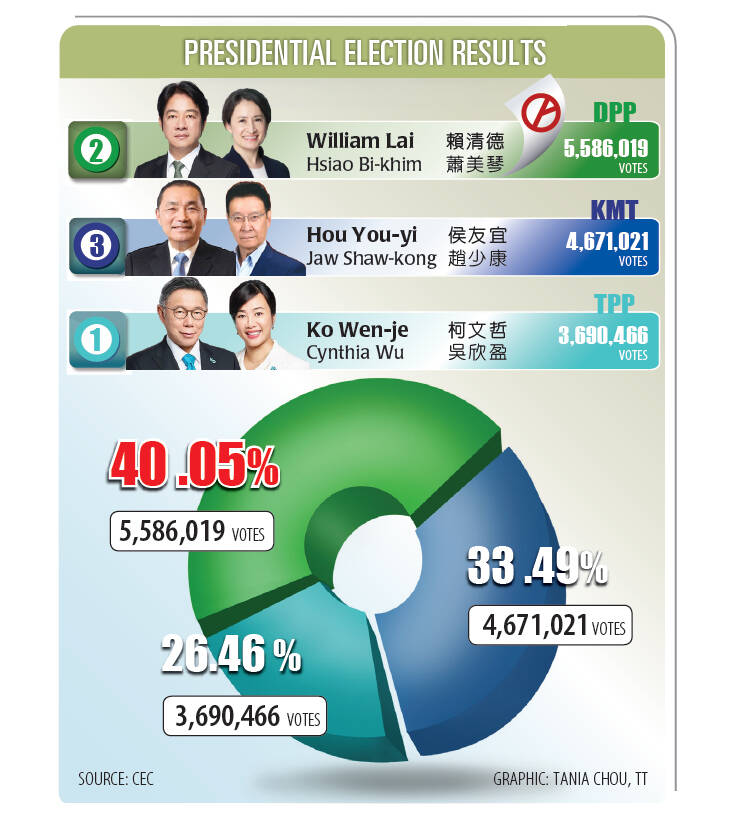
In 2020, the DPP’s presidential ticket won 8,170,231 votes, or 57.13 percent of the 19,311,105 registered voters, with the then-KMT presidential ticket garnering 5,522,119 votes (38.61 percent) and the People First Party’s ticket getting 608,590 votes (4.26 percent). The voter turnout in that election was 74.9 percent.
In a victory speech in front of thousands of jubilant supporters at his national campaign headquarters in New Taipei City, Lai thanked voters for their support.
“I want to thank Taiwanese for writing a new chapter in our democracy,” he said. “We are telling the international community that between democracy and authoritarianism, we will stand on the side of democracy.”
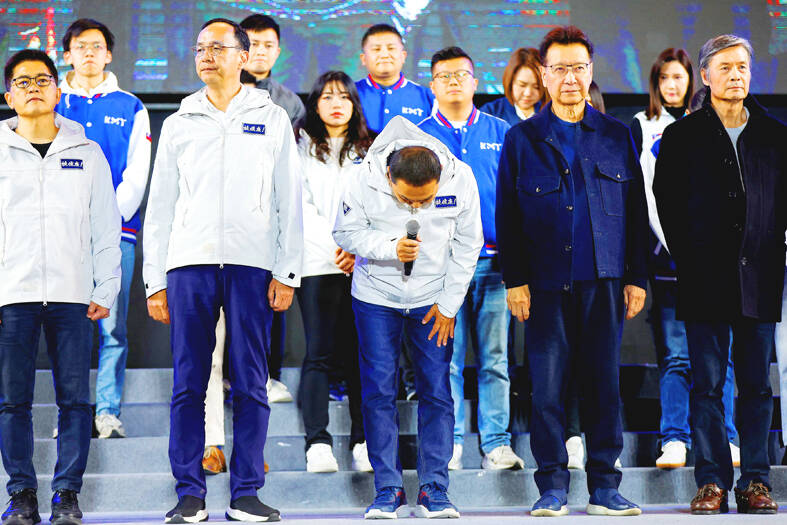
Photo: Carlos Garcia Rawlins, Reuters
“Being the first election in this global election year, Taiwan has achieved the first victory for the alliance of democracies and successfully deterred interference from external forces,” he said. “It is all because we believe in electing our own president, and the nation will continue walk on the right path and not turn back.”
Lai reiterated that safeguarding peace and stability in the Taiwan Strait would be an important mission in his presidency, adding that he would work to maintain the “status quo,” while engaging in exchanges and dialogues with China based on an equal footing.
Noting that he had received congratulatory telephone calls from both of his opponents, Lai said that he has also congratulated the KMT and the TPP for their legislative wins and expressed the hope that they would work together for the nation.
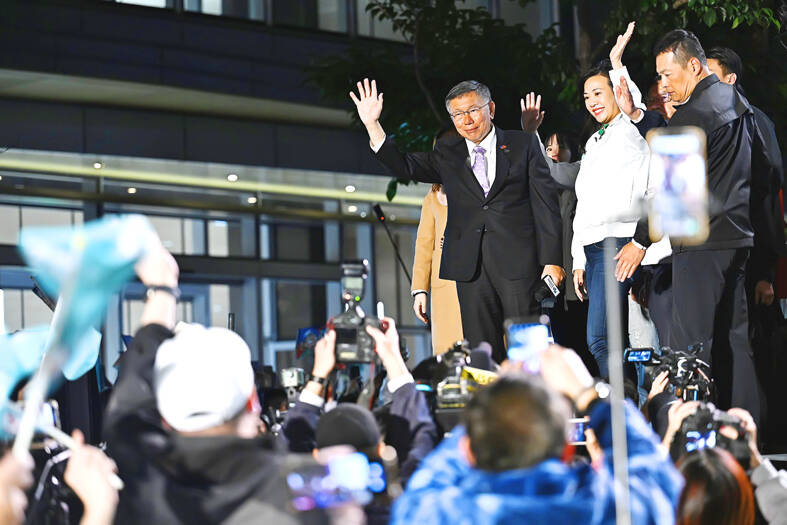
Photo: Chen Chih-chu, Taipei Times
“Now that the election is over, the conflicts and high emotions that have occurred in the course of the campaign should end,” he said. “Taiwan’s 23 million people are a family. Let us unite and move the nation forward.”
Hou conceded defeat at a news conference at 8pm.
“I am sorry I have let everyone down,” he said, before bowing in front of supporters, adding that he had not tried hard enough “to make a transfer of power possible.”
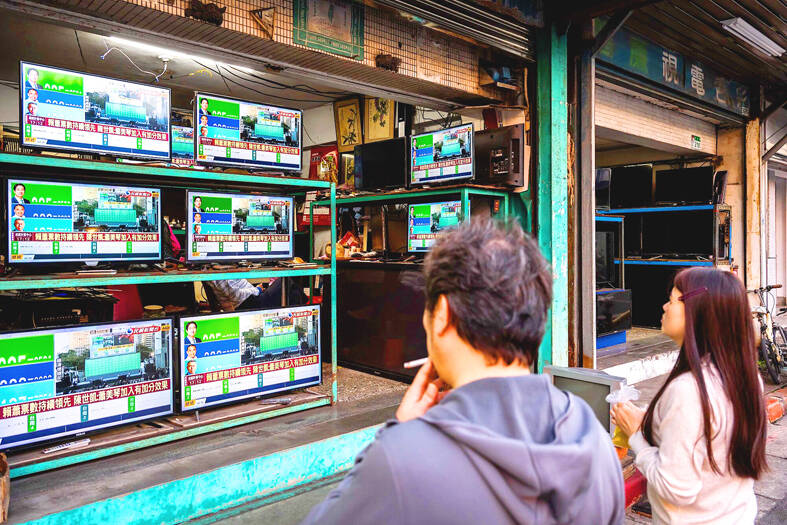
Photo: Billy H.C. Kwok, Bloomberg
He said that a democracy means that people are masters of their government, and he fully respects Taiwanese voters’ decision, as he extended congratulations to Lai and his running mate, Hsiao Bi-khim (蕭美琴).
He added that he hopes that Lai and Hsiao would not let voters down.
“The governing party must listen to the people’s voices,” he said.
Hou told his supporters to not give up hope.
“We can be sad, but not deflated,” he said.
“Let’s turn our sadness into a force to keep the DPP in check. That is the force needed to keep Taiwan moving forward, and also the force for safeguarding the Republic of China,” he added.
Ko, who has won a passionate support base in recent years, especially among young voters, also called a news conference at 8pm and conceded the election.
Despite losing, he said the TPP “has proven to the world that Taiwan is no longer just blue and green.”
“On the path of justice and sustainable development, I will not give up and I urge everyone not to give up either,” Ko said.
“You are the nation’s future, you are also the reason that the TPP and I will continue,” he said, adding that “democracy is ultimately Taiwan’s most important asset,” and the TPP would seek to build more support over the next four years.
President Tsai Ing-wen (蔡英文) is constitutionally barred from standing again after two terms in office.
The new president and vice president are to be sworn in on May 20.

INVESTIGATION: The case is the latest instance of a DPP figure being implicated in an espionage network accused of allegedly leaking information to Chinese intelligence Democratic Progressive Party (DPP) member Ho Jen-chieh (何仁傑) was detained and held incommunicado yesterday on suspicion of spying for China during his tenure as assistant to then-minister of foreign affairs Joseph Wu (吳釗燮). The Taipei District Prosecutors’ Office said Ho was implicated during its investigation into alleged spying activities by former Presidential Office consultant Wu Shang-yu (吳尚雨). Prosecutors said there is reason to believe Ho breached the National Security Act (國家安全法) by leaking classified Ministry of Foreign Affairs information to Chinese intelligence. Following interrogation, prosecutors petitioned the Taipei District Court to detain Ho, citing concerns over potential collusion or tampering of evidence. The

NEGOTIATIONS: Taiwan has good relations with Washington and the outlook for the negotiations looks promising, Minister of Economic Affairs J.W. Kuo said Taiwan’s GDP growth this year is expected to decrease by 0.43 to 1.61 percentage points due to the effects of US tariffs, National Development Council (NDC) Minister Paul Liu (劉鏡清) said at a meeting of the legislature’s Economics Committee in Taipei yesterday, citing a preliminary estimate by a private research institution. Taiwan’s economy would be significantly affected by the 32 percent “reciprocal” tariffs slapped by the US, which took effect yesterday, Liu said, adding that GDP growth could fall below 3 percent and potentially even dip below 2 percent to 1.53 percent this year. The council has commissioned another institution

NEGOTIATIONS: The US response to the countermeasures and plans Taiwan presented has been positive, including boosting procurement and investment, the president said Taiwan is included in the first group for trade negotiations with the US, President William Lai (賴清德) said yesterday, as he seeks to shield Taiwanese exporters from a 32 percent tariff. In Washington, US Trade Representative Jamieson Greer said in an interview on Fox News on Thursday that he would speak to his Taiwanese and Israeli counterparts yesterday about tariffs after holding a long discussion with the Vietnamese earlier. US President Donald Trump on Wednesday postponed punishing levies on multiple trade partners, including Taiwan, for three months after trillions of US dollars were wiped off global markets. He has maintained a 10 percent

TRADE: The premier pledged safeguards on ‘Made in Taiwan’ labeling, anti-dumping measures and stricter export controls to strengthen its position in trade talks Products labeled “made in Taiwan” must be genuinely made in Taiwan, Premier Cho Jung-tai (卓榮泰) said yesterday, vowing to enforce strict safeguards against “origin laundering” and initiate anti-dumping investigations to prevent China dumping its products in Taiwan. Cho made the remarks in a discussion session with representatives from industries in Kaohsiung. In response to the US government’s recent announcement of “reciprocal” tariffs on its trading partners, President William Lai (賴清德) and Cho last week began a series of consultations with industry leaders nationwide to gather feedback and address concerns. Taiwanese and US officials held a videoconference on Friday evening to discuss the